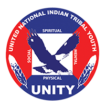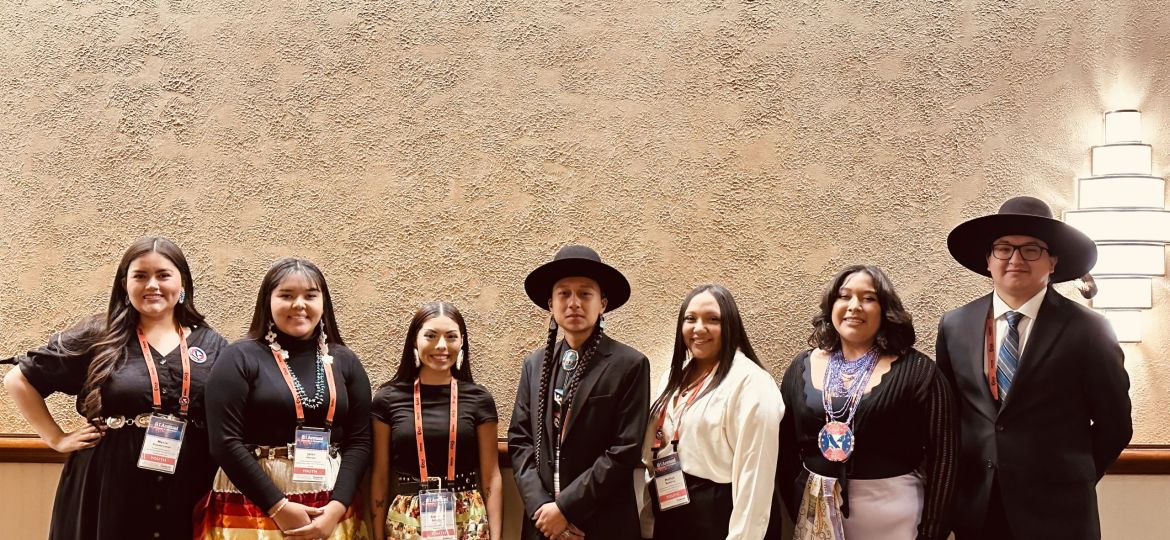
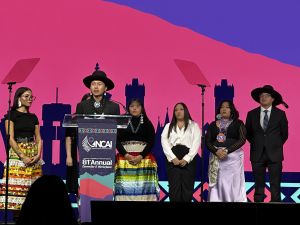
In a powerful convergence of culture and leadership, UNITY’s Executive Committee traveled to Las Vegas, Nevada, to participate in the 81st Annual National Congress of American Indians (NCAI) Convention. The convention served as a vital platform for dialogue, collaboration, and the celebration of tribal sovereignty and self-determination.
This year marked the third year of partnership between UNITY and NCAI. During a general assembly, UNITY Co-Presidents Kaytlynn Johnston and Watson Whitford, alongside fellow Executive Committee members, delivered a powerful “State of Native Youth Address” that resonated with the NCAI membership. These ongoing partnerships strengthen the collaborations between the National UNITY Council Executive Committee and the NCAI Youth Commission in a shared vision to uplift Native youth voices.
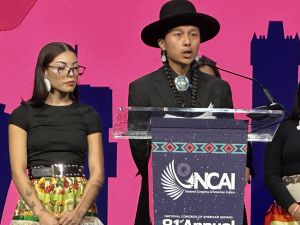
The Co-Presidents expressed gratitude for the efforts of tribal leaders, with Whitford stating, “We are thankful for your wisdom, sacrifices, and unwavering dedication to preserving our cultures, protecting our lands, and strengthening our communities. Today, we bring forth a message that transcends gratitude — it is a call for action, collaboration, and shared responsibility to address the pressing issues facing Native youth.”
The Co-Presidents highlighted significant achievements while also confronting urgent challenges, outlining a collaborative path toward healing and impactful solutions that prioritize the needs of Native youth across Indian Country. Johnston emphasized the importance of UNITY’s 2024-2025 Top 10 Issues Facing Native Youth, adopted by the National UNITY Council in July of 2024.
“Our generation faces challenges that are both unique and long-standing. While we take pride in our heritage, we must also address the modern realities that threaten our well-being, growth, and potential.” Their inspiring vision sparked a collective commitment to progress and empowerment for the future.
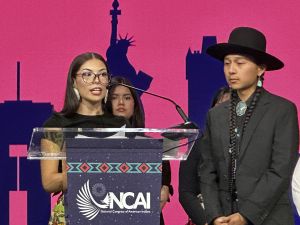
The Co-Presidents issued a call to action to tribal leaders: “These are not just issues; they are realities that shape the lives of Native youth every day,” Johnston stated. “We need your help. We need your leadership. We need your commitment to working with us to find solutions. This is not a call for pity, but a call for partnership,” underscoring the necessity of collaboration to tackle these pressing challenges.
Whitford remarked, “We know the path ahead will not be easy, but together we can ensure that Native youth not only survive but thrive. We are resilient, we are determined, and with your guidance, we will carry our people into a future that honors our past and embraces our potential.” This message brought hope and optimism for the strength of Native youth leadership in shaping the future.
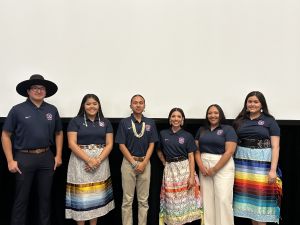
Additionally, the UNITY Delegation facilitated an “Advocacy in Action” training, a key component of the NCAI Youth Convention agenda, attended by over 50 Native youth. Supported by UNITY staff, this training emphasized the importance of advocacy and policy, civic engagement, community support, and asset mapping. UNITY youth leaders facilitated exercises on creating a one-page summary to present to decision-makers and tribal leaders on topics they wish to advocate for. These peer-to-peer interactions fostered rich dialogue among participants, reflecting a strong commitment to advocacy and community engagement among the Native youth present.
